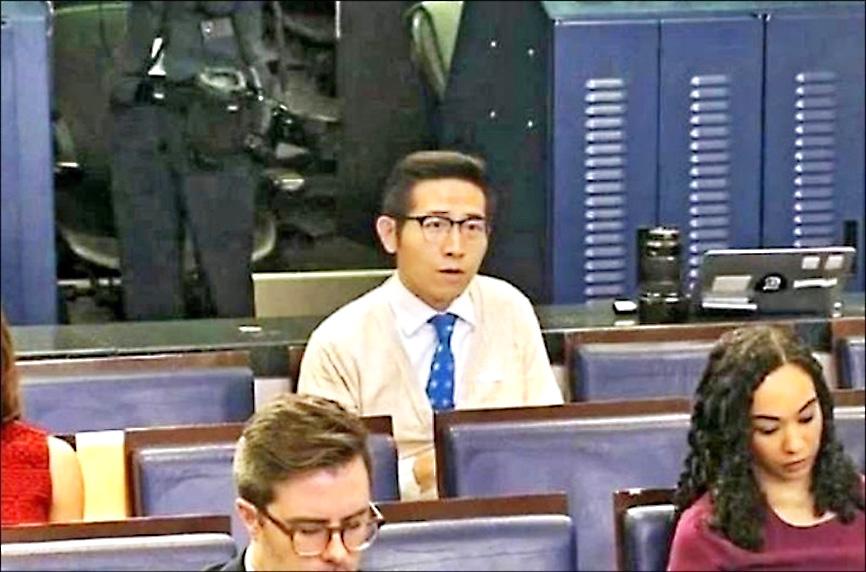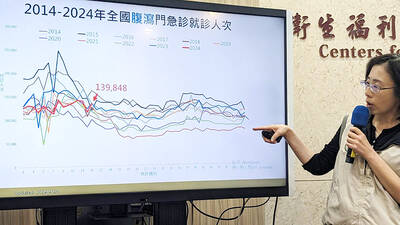The government is investigating 87 Taiwanese allegedly working for the Chinese government after reporter Chang Ching-yi (張經義) was found to be employed by a Chinese state-run news agency, a source familiar with the matter said.
Chang, a White House correspondent for Shanghai Dragon TV, generated controversy at a White House news briefing on April 8 when he was asked by US President Donald Trump where he was from.
Instead of saying he represented the Chinese television station, Chang said that he was from Taiwan.

Photo: Video grab from the whitehouse.gov Web site
Shanghai Dragon TV is a member of Shanghai Media Group, a state-owned mouthpiece of the Chinese Communist Party (CCP).
Article 33 of the Act Governing Relations Between the People of the Taiwan Area and the Mainland Area (臺灣地區與大陸地區人民關係條例) prohibits Taiwanese from working for Chinese political, military and government organizations, with offenders facing fines of NT$100,000 to NT$500,000 (US$3,339 to US$16,694).
The National Communications Commission has formed a task force to investigate Chang, it said last week, but added that it would allow Chang to state his case before determining a penalty.
Over the past few years, the government has fined 37 Taiwanese NT$4.5 million for working for such organizations in China. Thirty-three worked as assistants to borough wardens, two worked as members of the Chinese People’s Political Consultative Conference (CPPCC), one was a deputy director of an innovation center and one was a deputy director of a business recruitment bureau.
The Ministry of the Interior (MOI) fined Ling Yu-shih (凌友詩) NT$500,000 for working as a CPPCC member, but Ling has not yet paid the penalty, an official said on condition of anonymity.
Ling sparked controversy after enthusiastically singing China’s praises, while describing herself as a “girl from Taiwan” at a CPPCC meeting in March last year.
Despite maintaining her household registration in Taiwan, Ling has not returned to Taiwan since the CPPCC meeting, so the government has not been able to collect the fine, the official said.
Several government agencies — including the MOI, the Ministry of Economic Affairs, the Ministry of Justice, the Ministry of Education and the Council of Agriculture — are investigating an additional 87 cases of Taiwanese illicitly working in China, the official added.
A technology correspondent, a judge’s assistant, various posts at state-run enterprises and a Taipei-based stringer for Chinese state-run tabloid the Global Times are among the jobs being investigated, the official said.
In related news, the CPPCC’s National Committee advised that the 13th conference be held on May 21 in Beijing, while the Standing Committee of China’s National People’s Congress announced that the congress is to be held on May 22 in Beijing.
Both had been postponed from their original dates at the beginning of last month, as China had not yet contained its COVID-19 outbreak, Chinese media reported.

FLU SEASON: Twenty-six severe cases were reported from Tuesday last week to Monday, including a seven-year-old girl diagnosed with influenza-associated encephalopathy Nearly 140,000 people sought medical assistance for diarrhea last week, the Centers for Disease Control (CDC) said on Tuesday. From April 7 to Saturday last week, 139,848 people sought medical help for diarrhea-related illness, a 15.7 percent increase from last week’s 120,868 reports, CDC Epidemic Intelligence Center Deputy Director Lee Chia-lin (李佳琳) said. The number of people who reported diarrhea-related illness last week was the fourth highest in the same time period over the past decade, Lee said. Over the past four weeks, 203 mass illness cases had been reported, nearly four times higher than the 54 cases documented in the same period

A group of Taiwanese-American and Tibetan-American students at Harvard University on Saturday disrupted Chinese Ambassador to the US Xie Feng’s (謝鋒) speech at the school, accusing him of being responsible for numerous human rights violations. Four students — two Taiwanese Americans and two from Tibet — held up banners inside a conference hall where Xie was delivering a speech at the opening ceremony of the Harvard Kennedy School China Conference 2024. In a video clip provided by the Coalition of Students Resisting the CCP (Chinese Communist Party), Taiwanese-American Cosette Wu (吳亭樺) and Tibetan-American Tsering Yangchen are seen holding banners that together read:

UNAWARE: Many people sit for long hours every day and eat unhealthy foods, putting them at greater risk of developing one of the ‘three highs,’ an expert said More than 30 percent of adults aged 40 or older who underwent a government-funded health exam were unaware they had at least one of the “three highs” — high blood pressure, high blood lipids or high blood sugar, the Health Promotion Administration (HPA) said yesterday. Among adults aged 40 or older who said they did not have any of the “three highs” before taking the health exam, more than 30 percent were found to have at least one of them, Adult Preventive Health Examination Service data from 2022 showed. People with long-term medical conditions such as hypertension or diabetes usually do not

Heat advisories were in effect for nine administrative regions yesterday afternoon as warm southwesterly winds pushed temperatures above 38°C in parts of southern Taiwan, the Central Weather Administration (CWA) said. As of 3:30pm yesterday, Tainan’s Yujing District (玉井) had recorded the day’s highest temperature of 39.7°C, though the measurement will not be included in Taiwan’s official heat records since Yujing is an automatic rather than manually operated weather station, the CWA said. Highs recorded in other areas were 38.7°C in Kaohsiung’s Neimen District (內門), 38.2°C in Chiayi City and 38.1°C in Pingtung’s Sandimen Township (三地門), CWA data showed. The spell of scorching